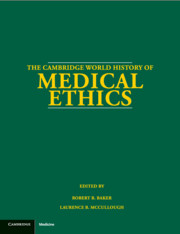Book contents
- Frontmatter
- PART I AN INTRODUCTION TO THE HISTORY OF MEDICAL ETHICS
- PART II A CHRONOLOGY OF MEDICAL ETHICS
- PART III DISCOURSES OF MEDICAL ETHICS THROUGH THE LIFE CYCLE
- PART IV THE DISCOURSES OF RELIGION ON MEDICAL ETHICS
- PART V THE DISCOURSES OF PHILOSOPHY ON MEDICAL ETHICS
- PART VI THE DISCOURSES OF PRACTITIONERS ON MEDICAL ETHICS
- PART VII THE DISCOURSES OF BIOETHICS
- PART VIII DISCOURSES ON MEDICAL ETHICS AND SOCIETY
- Ethical and Legal Regulation of Medical Practice and Research
- B Medical Ethics, Imperialism, and the Nation-State
- 52 Colonialism, Imperialism, and the History of Latin American Medical Ethics
- 53 Japanese Doctors’ Experimentation, 1932–1945, and Medical Ethics
- 54 Medical Ethics and Nazism
- 55 Medical Ethics and Communism in the Soviet Union
- 56 Medical Ethics and Communism in Eastern Europe
- 57 The Ethics of Military Medical Research in the United States during the Cold War
- 58 Medical Ethics and the Military in South Africa during Apartheid: Judging History
- C Medical Ethics and Health Policy
- Appendix: Biographies: Who Was Who in the History of Medical Ethics
- Bibliography
- Index
54 - Medical Ethics and Nazism
from B - Medical Ethics, Imperialism, and the Nation-State
Published online by Cambridge University Press: 28 May 2012
- Frontmatter
- PART I AN INTRODUCTION TO THE HISTORY OF MEDICAL ETHICS
- PART II A CHRONOLOGY OF MEDICAL ETHICS
- PART III DISCOURSES OF MEDICAL ETHICS THROUGH THE LIFE CYCLE
- PART IV THE DISCOURSES OF RELIGION ON MEDICAL ETHICS
- PART V THE DISCOURSES OF PHILOSOPHY ON MEDICAL ETHICS
- PART VI THE DISCOURSES OF PRACTITIONERS ON MEDICAL ETHICS
- PART VII THE DISCOURSES OF BIOETHICS
- PART VIII DISCOURSES ON MEDICAL ETHICS AND SOCIETY
- Ethical and Legal Regulation of Medical Practice and Research
- B Medical Ethics, Imperialism, and the Nation-State
- 52 Colonialism, Imperialism, and the History of Latin American Medical Ethics
- 53 Japanese Doctors’ Experimentation, 1932–1945, and Medical Ethics
- 54 Medical Ethics and Nazism
- 55 Medical Ethics and Communism in the Soviet Union
- 56 Medical Ethics and Communism in Eastern Europe
- 57 The Ethics of Military Medical Research in the United States during the Cold War
- 58 Medical Ethics and the Military in South Africa during Apartheid: Judging History
- C Medical Ethics and Health Policy
- Appendix: Biographies: Who Was Who in the History of Medical Ethics
- Bibliography
- Index
Summary
INTRODUCTION
Medicine under National Socialism raises profound questions about medical and research ethics. How was it possible that men and women sworn to the Hippocratic tradition of nihil nocere (to do no harm), trained as professionals in one of the most advanced scientific cultures, could disregard the dignity of human beings, ignore principles of informed consent, beneficence, and care and commit crimes of previously unseen proportions? Did they know that they were committing a crime, and how did they sanction their role? The history of medicine under Nazism strongly conflicts with traditional views and expectations of professional medical conduct, and thus needs to be assessed in its specific ideological and cultural context. The complexities surrounding these issues are an integral part of a wider political history of medicine and history of ideas. How do ideological and political formations shape the understanding of ethics and the code of conduct of the medical profession? How can we explain that most of the doctors did not value the life of the individual higher than their duty toward the state, the community, the party, or the Führer?
This chapter provides a contextualized and cross-cultural account of Nazi medicine and political ideology and discusses the extent to which medical ethics was shaped by racial theories and politics. Key ideological concepts of National Socialism such as its deeply rooted racism, racial hygiene, the concept of the Volkskörper (body politic), and anti-Semitism need to be addressed.
- Type
- Chapter
- Information
- The Cambridge World History of Medical Ethics , pp. 595 - 608Publisher: Cambridge University PressPrint publication year: 2008

